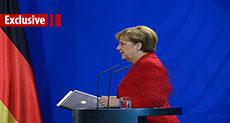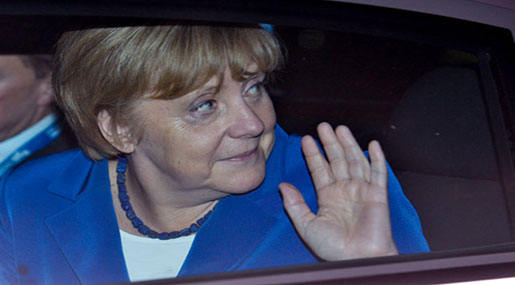
Is Merkel on her Way Out?

Darko Lazar
Germany's Social Democrats (SPD) have secured the largely ceremonial post of president in their push to challenge Chancellor Angela Merkel for the country's top job in September.

Frank-Walter Steinmeier swapped Germany's foreign ministry for the presidency after being elected as the head of state on February 12. Steinmeier's victory is certain to put wind in the sails of his fellow social democrat and candidate for Germany's premiership, Martin Shultz.
According to the latest polls, Schulz's SDP gained 6 percentage points to bring the party's overall support to 30%, while Merkel's conservative bloc lost 2 points, falling to 34%.
As such, Schulz could very well be the one to retire Merkel and send her into the history books, where the chancellor has already reserved her place for being the first German woman to lead the Chancellery - if not for her policies.
An invitation from Moscow
Steinmeier, 61, has enjoyed a career unscathed by scandals, maintaining good relationships abroad, as well as the respect of his opponents at home - in part thanks to his personal life, in which he's known for donating a kidney to his ailing wife.
He spent a quarter of a century in politics, during which he occupied a long list of offices, including the post of under-secretary of state in the Federal Chancellery, which is responsible for overseeing the work of the country's most powerful intelligence agencies.
He was also a close aide of former Chancellor Gerhard Schroder, serving as his chief of staff during a period that was noted as the peak of Russo-German relations.
Perhaps unsurprisingly, Vladimir Putin was among the first to congratulate his German counterpart, inviting Steinmeier to "visit Russia at his convenience".
Putin's gesture has not gone unnoticed, given that he completely ignored the outgoing German president Joachim Gauck for the entirety of his five-year term in office. During that time, the Russian leader met with Merkel on numerous occasions, but not once had he bothered to engage in any form of dialogue with Gauck.
These little details have been picked up by the press, inevitably leading to Steinmeier being labeled as ‘Russia's man in Berlin'.
The awakening
Steinmeier's ascent to the presidency at a time when the SDP - Germany's oldest political party - finds itself in a state of crisis, can only serve as incentive for the social democrat Martin Shultz in his bid for the Chancellery.
Shultz's ambitions and the manner in which he is being received by the German public suggest that he may be the right man to take the once-powerful party out of its lethargic state, becoming Germany's ‘man of hope'.
According to recent polling, about two thirds of Germans think that after having Merkel in office for the past 12 years, it's time for a change.
To the question of "do you think it's time for a change in who is the chancellor of Germany?", 42% of those polled said "definitely", while 22% said "yes, probably".
In eastern Germany, hardest hit by the influx of migrants - resulting from Merkel's open door policy - 69% of those polled think that the previously ‘unbeatable' chancellor should go.
It is difficult to predict whether Shultz can maintain this momentum until legislative elections, slated for September.
But the current political climate in Europe's economic powerhouse is increasingly being compared to Gerhard Schroder's win over Helmut Kohl who was dreaming of breaking Otto von Bismarck's record as the longest-serving German chancellor.
Back in 1998, Schroder's message to the German electorate was simple: "The Kohl era is over".
Tired and demoralized
Almost everyone in Germany has noticed the difference between the "burned-out" Merkel and the "hungry" Shultz.
Thus, German publications generally opposed to the SDP are now openly pointing to what could very well be a key factor in determining the outcome of the upcoming election.
According to an editorial by Der Spiegel's Dirk Kurbjuweit, Germany is being transformed into a "politically" mobilized society.
"Merkel never wanted the German people to become particularly active politically. Instead, she sought to calm people, assuage their fears and lull them to sleep - to deprive democracy of political oxygen," Kurbjuweit writes.
He explains that Schulz's candidacy "is ushering in the second phase of mobilization," as Merkel increasingly looks "tired, even exhausted".
Amid growing anxiety in Merkel's own Christian Democratic Union (CDU), Germany's Finance Minister Wolfgang Schäuble and one of the chancellor's closest allies, rushed to her aid recently comparing Shultz to US President Donald Trump.
"In a time when populism is seducing people the world over, politicians should not speak like Mr. Schulz." Schäuble told Der Spiegel, "if he wants to fight populism, as he claims, he should take note of these facts."
"If Schulz allows his supporters to use the slogan 'Make Europe Great Again', then he is Trump almost word-for-word," Schäuble added.
Trump's victory, along with his style of governance, often described by European politicians as ‘wild' and ‘chaotic', was initially expected to help Merkel secure her fourth term in office. The hope was that Germans would opt for what they know rather than what they don't, at a time of global uncertainty.
To what degree Merkel manages to capitalize on any of this will become clearer in the coming months.
Until then, pledges by both sides that the German elections would not be reminiscent of the political earthquake caused by the recent voting patterns in the US and Britain should not be taken too seriously.
It is still a long time between now and September, leaving the door open for plenty of surprises.
Al-Ahed News



